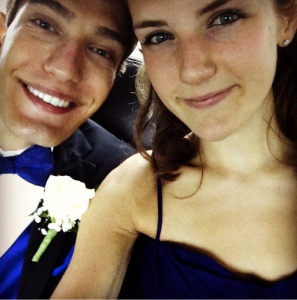As I rummage around prom dresses in Macy’s with my mom, the colors, shapes, and sizes vary: some are ugly, some are too sparkly, some have that weird layout where it is impossible to know where the head and arms go through. I pick out a couple of them, and we go to the dressing room to see their potential. As I try on each dress, I become more and more excited. “Wow, these would have never fit me a couple of months ago! I’m surprised this looks okay on me!” As I stand in front of the mirror, looking at myself, I see myself frown. “My stomach and thighs are still pretty big, can’t you see that, mom?” As I insistently complained, I see my mom frown in a way I had never seen before; her face was the real-life representation of a mixture between complete horror and disappointment. “Francesca, I can clearly see your ribcage. You look as if you haven’t eaten your whole life”.
Little did I know, our perceptions were complete opposites, and mine was dragging me down and leading me towards complete destruction. This is the experience that opened my eyes to my eating disorder.
Anorexia Nervosa, in general terms, is an eating disorder characterized by little to no eating, obsessiveness over what is being consumed in the past, present, and future, and a skewed perception of visualizations of one’s body image and composition. These characterizations represent a few of many that take control of the lives of young women and men who struggle to see the true beauty within themselves. Many STILL idolize celebrities today concerning their bodies and how they are portrayed to society. This, along with the stigma of using body image alone in shaping one’s character and determining their place in life, fuel the minds of those who believe they are not good enough for their goals, their aspirations, or the people that are in their lives.
I was always a little overweight as a child, and I was bullied for looking the way I did in grade school. I never felt as if it had affected me, but the words people threw at me were the words that I subconsciously carried. I decided that I had enough with being, in my eyes, “overweight” and I started to run and count my calories. Counting calories, though helpful in situations where it is required medically, can damage one’s perception of food, and wrongly establishes separations between “good” and “evil” foods. It also creates goals for the individual wanting to lose weight. I wanted to lose around one pound a week, and I identified myself as a someone who performed light exercise, which gave me a permitted calorie intake of about 1100 calories a day. 1100 CALORIES A DAY. I now look back and think, how the HECK did I follow this?! You think it would be humanely impossible to maintain this intake, but I did, and practiced this for about 5-6 months. I ended up losing 30 pounds in those 5-6 months, and I was placed in the 10th percentile of my BMI and body fat content, which is dangerously low. I also stopped getting my period, otherwise known as amenorrhea, which threw my metabolism and hormones out of whack. I wasn’t myself; I was moody, jumpy, fatigued, and afraid of every little thing I could do wrong.
After visiting my doctor, and sorting out a plan where I would gain weight in a healthy fashion, I spiraled into a cycle of starving myself and proceeding to binge, since my body was in desperate need of food. This activity is actually common among those who are trying to veer away from dieting trends; your mind is so invested in eating and acting a certain way towards food that you feel you cannot control when you want to eat, or how much you eat. Biologically, every time a person that is anorexic, or those who follow a strict and dangerous diet plan, the body feels as if eating is very rare, and it needs to make up for the time that it won’t be given nutrients (NEDA). This leads to uncontrollable eating to nausea, stomach pains from feeling overly full, and even vomiting. After putting my body through hell, I could not distinguish between what was right for my body, and what was satisfactory for my mind (which was seeing myself skinnier than ever before). Though I agreed to changing my ways, and I truly wanted to be healthy, my mind was not as far advanced as what I was saying or desiring; I still obsessed over what I looked like, and how skinny I perceived myself to be. Whenever I started to eat, I couldn’t stop myself, even when I felt sick to the point of passing out. The mind is a very powerful thing, and this concept definitely prevailed in this new and unsettling part of my eating disorder. It took me a long time to let go of my distorted perception, and accept myself for who I am, not for the body I cannot physically attain.
After battling these opposing eating disorders, I finally overcame them, and I am more confident than ever. I learned to eat in a balanced and healthy way for my own body. I have also reinforced the fact that exercise is an activity with an intended goal of making me stronger, and it is NOT intended for the sole purpose of losing weight. Body image is a very complicated subject, and it takes a long time to fully understand that one’s worth does not rely on what people see in the physicality of a human being. Your worth is NOT based on your body; it is based on what you think, how you feel, and how you choose to express yourself and your values.
I hope those that struggle to see their problems one day realize them, and strive to turn their mindset into one that is enriched with positive reinforcement. Utilizing positivity is very important in inspiring yourself to reach goals that seem too “out there”, or nearly impossible. The biggest, and most influential, help I received was from both myself and the words of others. After realizing I could not handle my eating disorder on my own during the beginning of my college career, I utilized my university’s nutrition services, where I saw a dietician and discussed how I felt about my eating disorder. Her advice, as well as my friends’ moral support, encouraged a more optimistic mindset, which fostered health for my well-being. Hearing her say she believed I was much stronger than I realized really changed my mindset, where I saw a different, more resilient side of myself. Once you realize you are stronger than you think, you can conquer anything in your way, leading to mental, physical, and psychological success. Keep moving forward, and life will eventually lead you to your destiny.
-Francesca Cocchiarale


